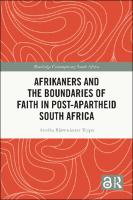Afrikaners and the Boundaries of Faith in Post-Apartheid South Africa
Proposal review
Abstract
This book examines the shifting moral and spiritual lives of white Afrikaners in South Africa after apartheid.
The end of South Africa’s apartheid system of racial and spatial segregation sparked wide-reaching social change as social, cultural, spatial and racial boundaries were transgressed and transformed. This book investigates how Afrikaners have mediated the country’s shifting boundaries within the realm of religion. For instance, one in every three Afrikaners used these new freedoms to leave the traditional Dutch Reformed Church (NGK), often for an entirely new religious affiliation within the Pentecostal or Charismatic churches, or New Religious Movements such as Wiccan neopaganism. Based on long-term ethnographic fieldwork in the Western Cape area, the book investigates what spiritual life after racial totalitarianism means for the members of the ethnic group that constructed and maintained that very totalitarianism. Ultimately, the book asks how these new Afrikaner religious practices contribute to social solidarity and integration in a persistently segregated society, and what they can tell us about racial relations in the country today.
This book will be of interest to scholars of religious studies, social and cultural anthropology and African studies.
Keywords
Africa;Afrikaners;Apartheid;Faith;Post-apartheid;Race;Religion;South AfricaDOI
10.4324/9781003185574ISBN
9781032028699, 9781003185574, 9781032028682, 9781000441635Publisher
Taylor & FrancisPublisher website
https://taylorandfrancis.com/Publication date and place
2022Imprint
RoutledgeSeries
Routledge Contemporary South Africa,Classification
Social and cultural anthropology
Religion and beliefs
Social discrimination and social justice


 Download
Download